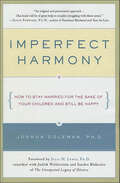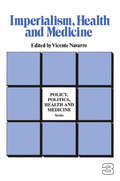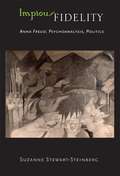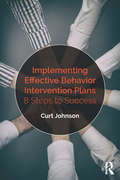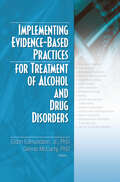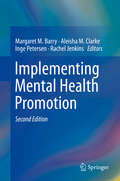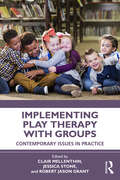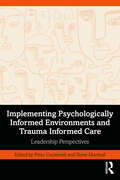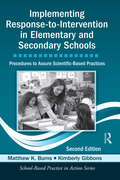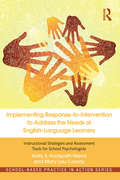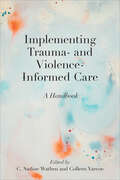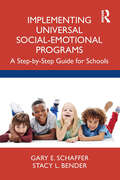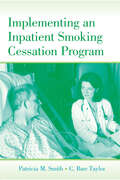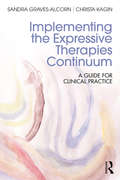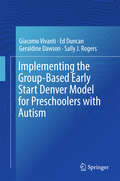- Table View
- List View
Imperfect Harmony: How to Stay Married for the Sake of Your Children and Still Be Happy
by Joshua ColemanDr. Joshua Coleman is a caring psychologist who nonetheless isn't afraid to tell the truth: not all marriages can be joyful at all times, but that isn't a cause for divorce, especially with children involved.Even if your marriage is never going to be the one you dreamed of, you can still live happily ever after. Dr. Coleman provides wise and compassionate advice on becoming a happy person in an unhappy situation.In this groundbreaking work, Dr. Coleman also teaches readers how to:- Reduce out-of-control conflict in the home- Let go of the fairy-tale marriage ideal and create a better reality- Accept change in your partner and make peace with what you can't change- Maintain domestic harmony in times of crisisUnhappy husbands and wives finally have an alternative to the devastation of divorce. And by maintaining imperfect harmony, each parent has the opportunity to love, to care for, and to teach his or her children "full-time."
Imperial Bedlam: Institutions of Madness in Colonial Southwest Nigeria (Medicine and Society #10)
by Jonathan SadowskyThe colonial government of southern Nigeria began to use asylums to confine the allegedly insane in 1906. These asylums were administered by the British but confined Africans. Yet, as even many in the government recognized, insanity is a condition that shows cultural variation. Who decided the inmates were insane and how? This sophisticated historical study pursues these questions as it examines fascinating source material—writings by African patients in these institutions and the reports of officials, doctors, and others—to discuss the meaning of madness in Nigeria, the development of colonial psychiatry, and the connections between them. Jonathan Sadowsky's well-argued, concise study provides important new insights into the designation of madness across cultural and political frontiers.Imperial Bedlam follows the development of insane asylums from their origins in the nineteenth century to innovative treatment programs developed by Nigerian physicians during the transition to independence. Special attention is given to the writings of those considered "lunatics," a perspective relatively neglected in previous studies of psychiatric institutions in Africa and most other parts of the world.Imperial Bedlam shows how contradictions inherent in colonialism were articulated in both asylum policy and psychiatric theory. It argues that the processes of confinement, the labeling of insanity, and the symptoms of those so labeled reflected not only cultural difference but also political divides embedded in the colonial situation. Imperial Bedlam thus emphasizes not only the cultural background to madness but also its political and experiential dimensions.
Imperial Subjects: Race and Identity in Colonial Latin America
by Andrew B. Fisher Matthew D. O'HaraIn colonial Latin America, social identity did not correlate neatly with fixed categories of race and ethnicity. As Imperial Subjects demonstrates, from the early years of Spanish and Portuguese rule, understandings of race and ethnicity were fluid. In this collection, historians offer nuanced interpretations of identity as they investigate how Iberian settlers, African slaves, Native Americans, and their multi-ethnic progeny understood who they were as individuals, as members of various communities, and as imperial subjects. The contributors' explorations of the relationship between colonial ideologies of difference and the identities historical actors presented span the entire colonial period and beyond: from early contact to the legacy of colonial identities in the new republics of the nineteenth century. The volume includes essays on the major colonial centers of Mexico, Peru, and Brazil, as well as the Caribbean basin and the imperial borderlands. Whether analyzing cases in which the Inquisition found that the individuals before it were "legally" Indians and thus exempt from prosecution, or considering late-eighteenth- and early-nineteenth-century petitions for declarations of whiteness that entitled the mixed-race recipients to the legal and social benefits enjoyed by whites, the book's contributors approach the question of identity by examining interactions between imperial subjects and colonial institutions. Colonial mandates, rulings, and legislation worked in conjunction with the exercise and negotiation of power between individual officials and an array of social actors engaged in countless brief interactions. Identities emerged out of the interplay between internalized understandings of self and group association and externalized social norms and categories. Contributors. Karen D. Caplan, R. Douglas Cope, Mariana L. R. Dantas, Mara Elena Daz, Andrew B. Fisher, Jane Mangan, Jeremy Ravi Mumford, Matthew D. O'Hara, Cynthia Radding, Sergio Serulnikov, Irene Silverblatt, David Tavrez, Ann Twinam
Imperialism, Health and Medicine (Policy, Politics, Health and Medicine Series)
by Vicente NavarroIncludes articles which offer an alternative view of the political and economic causes of substandard health care in the underdeveloped societies of the Third World.
Impersonal Enunciation, or the Place of Film (Film and Culture Series)
by Christian MetzChristian Metz is best known for applying Saussurean theories of semiology to film analysis. In the 1970s, he used Sigmund Freud's psychology and Jacques Lacan's mirror theory to explain the popularity of cinema. In this final book, Metz uses the concept of enunciation to articulate how films "speak" and explore where this communication occurs, offering critical direction for theorists who struggle with the phenomena of new media. If a film frame contains another frame, which frame do we emphasize? And should we consider this staging an impersonal act of enunciation? Consulting a range of genres and national trends, Metz builds a novel theory around the placement and subjectivity of screens within screens, which pulls in—and forces him to reassess—his work on authorship, film language, and the position of the spectator. Metz again takes up the linguistic and theoretical work of Benveniste, Genette, Casetti, and Bordwell, drawing surprising conclusions that presage current writings on digital media. Metz's analysis enriches work on cybernetic emergence, self-assembly, self-reference, hypertext, and texts that self-produce in such a way that the human element disappears. A critical introduction by Cormac Deane bolsters the connection between Metz's findings and nascent digital-media theory, emphasizing Metz's keen awareness of the methodological and philosophical concerns we wrestle with today.
Impersonal Passion: Language As Affect
by Denise RileyDenise Riley is renowned as a feminist theorist and a poet and for her remarkable refiguring of familiar but intransigent problems of identity, expression, language, and politics. In Impersonal Passion, she turns to everyday complex emotional and philosophical problems of speaking and listening. Her provocative meditations suggest that while the emotional power of language is impersonal, this impersonality paradoxically constitutes the personal. In nine linked essays, Riley deftly unravels the rhetoric of life's absurdities and urgencies, its comforts and embarrassments, to insist on the forcible affect of language itself. She teases out the emotional complexities of such quotidian matters as what she ironically terms the right to be lonely in the face of the imperative to be social or the guilt associated with feeling as if you're lying when you aren't. Impersonal Passion reinvents questions from linguistics, the philosophy of language, and cultural theory in an illuminating new idiom: the compelling emotion of the language of the everyday.
Impious Fidelity: Anna Freud, Psychoanalysis, Politics
by Suzanne Stewart-SteinbergIn Impious Fidelity, Suzanne Stewart-Steinberg investigates the legacy of Anna Freud at the intersection between psychoanalysis as a mode of thinking and theorizing and its existence as a political entity. Stewart-Steinberg argues that because Anna Freud inherited and guided her father's psychoanalytic project as an institution, analysis of her thought is critical to our understanding of the relationship between the psychoanalytic and the political. This is particularly the case given that many psychoanalysts and historians of psychiatry charge that Anna Freud's emphasis on defending the supremacy of the ego against unconscious drives betrayed her father's work.Are the unconscious and the psychoanalytic project itself at odds with the stable ego deemed necessary to a democratic politics? Hannah Arendt famously (and influentially) argued that they are. But Stewart-Steinberg maintains that Anna Freud's critics (particularly disciples of Melanie Klein) have simplified her thought and misconstrued her legacy. Stewart-Steinberg looks at Anna Freud's work with wartime orphans, seeing that they developed subjectivity not by vertical (through the father) but by lateral, social ties. This led Anna Freud to revise her father's emphasis on Oedipal sexuality and to posit a revision of psychoanalysis that renders it compatible with democratic theory and practice. Stewart-Steinberg gives us an Anna Freud who "betrays" the father even as she protects his legacy and continues his work in a new key.
Implausible Beliefs: In the Bible, Astrology, and UFOs
by Allan MazurWhy do people accept ideas that are contradicted by science or logic? In Implausible Beliefs, Allan Mazur offers a comparative look at the nature of irrational belief systems, their social roots, and their cultural and political impact. He begins by providing standards for judging beliefs implausible and assessing the impact of such belief systems onpolitics and social policy in the US. Mazur describes and defends commonsense criteria for establishing that certain views should not be sustained in the face of present-day understanding. He presents a statistical portrait of implausible beliefs rampant in the US, and who tends to accept them.Mazur applies criteria for implausibility to the Bible, astrology, and visitation to Earth of intelligent beings from other worlds. Pointing out that everyone "knows" the Bible but few actually read it, the author scrolls through the first five books of the text, noting points that undermine the scripture's natural history and moral guidance. Working on the assumption that implausible religious views are fundamentally no different from implausible secular views, he critiques secular beliefs in astrology and UFOs. Mazur concludes the volume with an attempt to explain why most people accept implausibility‘some more than others despite evidence and logic that refute them.Looking to mainstream sociology and psychology, Mazur shows how children are socialized into such beliefs, and how adults are influenced by spouses and friends. Personality is also a factor, sometimes abetted by stressful or lonely life situations. Lucidly written, this is a provocative and informative contribution to social psychology, sociology, religion, political science, and American studies.
Implementation Fidelity in Education Research: Designer and Evaluator Considerations
by Coby Meyers W. Christopher BrandtImplementation science is an important and underrepresented topic in the literature of educational research, despite the fact that it is inextricably tied to education policy and improvement. Implementation fidelity (the degree to which a program or intervention is delivered as planned) is, in particular, a key issue for every program developer and researcher designing, executing, interpreting, or communicating their work. Implementation Fidelity in Education Research provides the first serious developer-evaluator collaborative perspective on the practical considerations of implementation fidelity in program development. Using case studies from Investing in Innovation (i3) fund grants, this book prepares future researchers for the challenges posed by implementation issues both ideologically and in practice. This book will be an excellent resource for anyone interested in education research and evaluation and an excellent supplement to research methods courses.
Implementing Classwide PBIS: A Guide to Supporting Teachers (The Guilford Practical Intervention in the Schools Series)
by Jennifer Freeman Diane Myers Brandi SimonsenFilling a vital need, this is the first comprehensive guide to supporting K–12 teachers in effective implementation of classwide positive behavioral interventions and supports (CWPBIS). The book presents a roadmap for designing and delivering professional development based on behavioral principles. Procedures are outlined for providing data-driven CWPBIS training and coaching that is responsive to the needs of each teacher. User-friendly features include illustrative case studies, learning questions and exercises at the end of each chapter, and reproducible training tools. The large-size format and lay-flat binding facilitate photocopying; purchasers also get access to a Web page where they can download and print the reproducible materials. See also the authors' related teacher/practitioner resource: Classwide Positive Behavior Interventions and Supports: A Guide to Proactive Classroom Management. This book is in The Guilford Practical Intervention in the Schools Series, edited by Sandra M. Chafouleas.
Implementing Competency-Based Training and Assessment in Aviation
by Norman MacLeodImplementing Competency-Based Training and Assessment in Aviation explains in detail, with examples, how to implement Competency‑Based Training and Assessment in aviation. It describes how to develop competence models, assess workplace competence and understand the role of competence models in recruitment and selection.Taking the framework published by ICAO, this book breaks it down into its component parts and explains how to identify the changes in behaviour needed to enable individuals to act safely and efficiently in hazardous environments. It outlines the framework that underpins training intervention design and investigates tactics of intervention based on current evidence around efficacy. This book acts as a guide to constructing classroom activities that serve as vehicles for addressing the link between declarative and process knowledge under controlled conditions.Airline personnel, pilots and aviation industry professionals involved in performance assessments and training will benefit from this book.
Implementing Effective Behavior Intervention Plans: 8 Steps to Success
by Curt JohnsonWhether written by a school psychologist, BCBA, or skilled practitioner of any variety, all behavior intervention plans face the same difficulty—the writer and implementer are not the same person. Too frequently, successful BIPs are discounted and discarded by those responsible for implementation. Many BIPs are simply filed, rather than followed. Without additional burden to time-constrained professionals, this book addresses how to effectively and efficiently increase implementation fidelity. Using a systems analysis approach to school climate, interwoven with ample case studies, school psychologists will be guided through eleven chapters of a step-by-step process to effectively create and implement behavior intervention plans.
Implementing Evidence-Based Practices for Treatment of Alcohol And Drug Disorders
by Jr. Eldon Edmundson Dennis McCarty"Implementing Evidence-Based Practices for Treatment of Alcohol and Drug Disorders" provides managers and clinicians with results from Practice Improvement Collaboratives (PIC) that demonstrate how substance abuse treatment can be improved by increasing the exchange of knowledge between community-based service providers and the research community. The book examines improvement collaboratives and mentoring strategies for adopting and using evidence-based practices. Contributors address how to determine the best treatment processes to serve clients, how to deal with the hurdles faced in preparing and training counsellors, and how to affect the needed changes in agency activities. This unique professional resource responds to an Institute of Medicine report that found a substantial disconnect between research and practice in treatment for drug and alcohol dependence. Focusing on how to make the changes necessary to support the adoption and use of evidence-based practices, the book documents the activities of four sites to illustrate how investigators and treatment practitioners worked together to implement evidence-based practices. Contributors examine the development and early implementation of Practice Improvement Collaboratives, the investigator-provider-policymaker model, Motivational Enhancement Therapy, the use of Opinion Leaders in training, and targeted strategies that take into account the differences in clinician demographics and training. "Implementing Evidence-Based Practices for Treatment of Alcohol and Drug Disorders" is an essential tool for alcohol and drug counsellors, directors of alcohol and drug treatment clinics, and instructors in counsellor training and academic programs.
Implementing Mental Health Promotion
by Margaret M. Barry Aleisha M. Clarke Inge Petersen Rachel JenkinsThis book offers a comprehensive overview of current research, policy, and practice developments in promoting mental health and well-being. It offers guidance on developing and delivering mental health promotion interventions across a variety of settings internationally. Chapters outline key mental health promotion concepts, implementation processes, and outcomes through empirical findings, practical advice based on successful evidence-based approaches, and templates for action. In addition, chapters answer key “how” questions on practical implementation as well as the “whys”, providing rationales for mental health promotion and identifying the key factors and underlying principles that make these interventions work. The book includes examples of evidence-based practice with 17 case studies of innovative interventions from different international settings. These case studies illustrate the practical aspects of intervention development and delivery and the realities of implementing policies and programes outside of controlled research conditions. Topics featured in this book include: · Interventions that promote gender equality. · Community empowerment models of mental health promotion. · Mental health promotion in the home for children and parents. · Promoting social and emotional learning in schools. · Addressing stress and promoting mentally healthy workplaces. · Mental health promotion within primary health care. · Re-orienting mental health services to mental health promotion for service users and caregivers. Implementing Mental Health Promotion, Second Edition, is a must-have resource for researchers, clinicians and related professionals, and policymakers as well as graduate students across such interrelated disciplines as health promotion, public health, child and school psychology, social work, clinical psychology, child and adolescent psychiatry, health psychology, educational policy and practice, school nursing, occupational therapy, school counseling, and family studies.
Implementing Play Therapy with Groups: Contemporary Issues in Practice
by Clair MellenthinImplementing Play Therapy with Groups is a new and innovative edited book bringing together experts from across the field of play therapy to explore how to facilitate group play therapy across challenging settings, diagnoses, and practice environments. Applying theoretical and empirical information to address treatment challenges, each chapter focuses on a specific treatment issue and explores ways the reader can implement group work within their play therapy work. Chapters also provide contemporary evidence-based clinical information in providing group therapy with specific populations such as working with children who have been exposed to violence, trauma, adoption, foster care, those who are chronically medically fragile, and more. This book will bring awareness to, and provide easily implemented play therapy knowledge and interventions for, child and family therapists who work in a range of settings including schools, hospitals, residential treatment centers, and community mental health settings.
Implementing Psychologically Informed Environments and Trauma Informed Care: Leadership Perspectives
by Peter Cockersell Sione MarshallThis book gathers together the experiences of leaders across sectors, organisations and client groups to help readers introduce, develop, and maintain psychologically informed environments (PIE) and trauma informed care (TIC) within their workspaces.Featuring the voices of providers, commissioners, consultants, and trainers from the NHS, local authorities, and the voluntary sector, this unique text includes chapters on implementing PIE across a range of overlapping fields, including young people’s, homelessness, mental health, and women’s services. Each chapter describes the contributors’ experiences of which factors and processes enable or disable successful implementation of PIE/TIC; the unique challenges of leadership within this process; and how to understand the different dynamics at play in an organisation that determine effectiveness. With an emphasis on practical examples underpinned by theory, and recommendations drawn from the emergent themes, the book acts as an invitation for leaders to explore how they can influence the growth and evolving shape of PIE and trauma informed approaches across health and social care and support settings, and beyond.This book will be an invaluable resource for aspiring and new, as well as experienced, leaders who are interested in implementing and enabling PIE and TIC in their organisations.
Implementing Response-to-Intervention in Elementary and Secondary Schools: Procedures to Assure Scientific-Based Practices, Second Edition (School-Based Practice in Action)
by Matthew K. Burns Kimberly GibbonsAn update to the bestselling first edition, this practical guidebook for implementing a school-wide Response-to-Intervention (RTI) model clearly and concisely presents issues from assessment and decision-making to Tiers I, II, and III interventions. The authors discuss what RTI is and why it is used, how to conduct assessments within an RtI system, and how to create a school-wide organization to facilitate RTI. Curricula, instruction, and intervention strategies for each Tier level covered in detail, and answers to frequently asked questions and tips for getting started are also provided. Each chapter has been extensively revised and updated with the most current research and work in the field. New to this edition are a chapter on RTI in early childhood settings and a section in each chapter focused on considerations for secondary schools. A companion CD includes forms, checklists, reports, and progress monitoring materials to assist practitioners in the implementation of interventions. With this valuable, practical resource, school-based practitioners will be able to put the information they read into action immediately to enhance the implementation of RtI services for their schools and students.
Implementing Response-to-Intervention to Address the Needs of English-Language Learners: Instructional Strategies and Assessment Tools for School Psychologists (School-Based Practice in Action)
by Holly S. Hudspath-Niemi Mary Lou ConroyThere is considerable concern surrounding the complex issue of how to meet the learning needs of English-language learners within general and special education programs. Implementing Response-to-Intervention to Address the Needs of English-Language Learners increases school psychologists’ knowledge of intervention strategies related to ELLs, through its examination of the challenges associated with evaluating ELLs and by providing a collaborative framework to enhance educational identification and placement in special education. It accomplishes this by incorporating research-based intervention approaches for ELLs and offering a comprehensive guide to the processes and tools that school teams should consider when utilizing a response to intervention model to support the academic and behavioral needs of ELLs. With a strong focus on alternative assessment, collaboration, and parental involvement, this volume in a definitive touchstone in the quest to provide culturally responsive pedagogy and appropriate adapted classroom instruction for English-language learners of various proficiency levels.
Implementing Single-Session Psychotherapy: When No Appointment Is Necessary
by Monte Bobele Arnold SliveThis book provides the theoretical underpinnings, research, support, and techniques, to implement open-access/single-session therapy.Open-access services have moved beyond walk-in or drop-in services and expanded to on-demand teletherapy, virtual, or same-day scheduling. This book explains how best to implement single-session therapy in all such services, highlighting how this kind of therapy can reduce barriers to care. It includes chapters on training single-session therapists, global applications, and major obstacles. A team of expert contributors provide clinical examples and applications from around the world.This book is essential for clinicians and professionals offering or thinking about offering single-session therapy in open-access services.
Implementing Transference-Focused Psychotherapy Principles: General Psychiatric Care for Personality Disorders
by Richard G. Hersh Chiara De PanfilisThis book focuses on the practical utility of key precepts of Transference-Focused Psychotherapy (TFP) in contemporary psychiatry. This volume actively addresses the pressing public health crisis related to high numbers of patients with personality disorder pathology, often with significantly compromised functioning associated with marked social burdens related to health costs and lost productivity. TFP is one of the empirically validated treatments for patients with borderline personality disorder (BPD). Building on this evidence base, the contributors to this volume describe their work in multiple clinical situations utilizing these principles with varying patient populations in different treatment settings. These settings include: the adult and adolescent day hospital, short term and extended inpatient hospitalizations, group therapy, and a range of outpatient services. Each chapter follows a consistent format to cover patient population, nature of treatment setting, overview of financial support, training of clinicians, treatment targets, elements of TFP employed, measurement of effectiveness, case study examples, and future research goals. Contributors from different backgrounds describe active use of TFP principles in their work, with adjustments from standard TFP protocol made accordingly. Implementing Transference-Focused Psychotherapy Principles builds on the growing literature about TFP by expanding the focus beyond the extended individual psychotherapy format. The text will resonate with psychiatrists, psychologists, social workers, and mental health counselors, among others. Clinicians involved in public health systems will find the material outlined of particular value in our evolving world of mental health services.
Implementing Trauma- and Violence-Informed Care: A Handbook
by Colleen Varcoe C. Nadine WathenThe need for health and social services to be trauma- and violence-informed has never been so pressing. In the wake of COVID-19, racial violence intensified and violence against women spiked globally. Mental health for many is worsening, while the ongoing toxic drug overdose crisis provides horrendous evidence of the impact of trauma, violence, stigma, and social inequities. Service providers across sectors are increasingly impacted by these dynamics and, without supportive environments, are burning out. Implementing Trauma- and Violence-Informed Care aims to support health and social service organizations and providers to create environments, policies, and practices to mitigate the harms of structural and interpersonal violence and the trauma that ensues. The book is organized around case examples of trauma- and violence-informed care (TVIC) implementation and impact in diverse settings, providing how-to guidance for getting started, sustaining momentum, and assessing outcomes. The book describes the importance of TVIC at multiple levels, from individual practices to organizational protocols and system-level policies, emphasizing TVIC’s alignment with system transformation goals. In doing so, the book presents TVIC as a call to action to improve service user experiences and outcomes, efficient and effective use of resources, and the health and well-being of staff, while addressing and reducing health and social inequities.
Implementing Universal Social-Emotional Programs: A Step-by-Step Guide for Schools
by Gary E. Schaffer Stacy L. BenderImplementing Universal Social-Emotional Programs is a step-by-step guide for school-based mental health professionals seeking to effectively select, employ, and evaluate universal social-emotional programs using implementation science. With one out of five children having diagnosable mental health challenges and many more of our youth developing social-emotional concerns, today’s schools must be able to effectively plan and implement evidence-based programs that promote social-emotional learning and positive academic outcomes. This book accompanies practitioners and graduate students in teaching, school psychology, counseling, social work, education, and administration through each stage of implementation science, common programs and screeners, the purpose and selection process of implementation teams, and schools’ expectations for fidelity, timeline, and budget. Throughout, the authors provide graphic organizers, diagrams, activities, exercises, vignettes, checklists, templates, charts, and other interactive features for active engagement.
Implementing an Inpatient Smoking Cessation Program
by Patricia M. Smith C. Barr TaylorImplementing an Inpatient Smoking Cessation Program serves as a step-by-step manual for implementing a cost-effective tobacco cessation program for hospitalized patients. Based on the Staying Free program, which has evidenced among the highest cessation rates reported in the scientific literature, this book is the result of decades of research by the authors. Although the book reviews a tobacco cessation program, the process is applicable to most behavioral interventions in acute- or long-term care settings.The book details the administrative responsibilities involved in designing, implementing, delivering, evaluating, and maintaining an inpatient tobacco cessation program. Its how-to approach focuses on the skills needed to: determine the work that needs to be done, select the appropriate interventions and providers, pay for and market the program, and create systems to keep the program alive. It provides algorithms for forecasting program enrollment and information on how to budget the program. Readers can then use this information as a blueprint for implementing their own program. A chapter on workflow provides a "virtual tour" of what to expect from the first 48 hours through the first year. Written in an accessible style with insightful interviews with actual providers, Implementing an Inpatient Smoking Cessation Program:*summarizes the literature on tobacco use, including the causal health effects and cost-effectiveness of cessation programs, to help readers build a case for a program;*reviews the clinical guidelines and advantages that support an inpatient program; and*provides tips on how to develop an effective program including insight into where the bottlenecks are likely to occur, and how to avoid them. Implementing an Inpatient Smoking Cessation Program is intended for health care administrators, providers, researchers, educators, and students in health care administration, public health, community and health psychology, (behavioral) medicine, nursing, respiratory therapy, and rehabilitation.
Implementing the Expressive Therapies Continuum: A Guide for Clinical Practice
by Sandra Graves-Alcorn Christa KaginImplementing the Expressive Therapies Continuum aims to explore the use of the Expressive Therapies Continuum (ETC) in the form of specific expressive therapy initiatives intended to be used in both educational and professional settings. Drawing on materials co-developed by Dr. Sandra Graves-Alcorn, co-author and developer of the ETC, as well as tried and tested curriculum by Professor Christa Kagin, this interdisciplinary resource will be of great value to students, teachers, mental health clinicians, as well as other healthcare practitioners interested in utilizing the ETC developmental model. All of this is delivered in a clear and easy to follow presentation designed to engage readers.
Implementing the Group-Based Early Start Denver Model for Preschoolers with Autism
by Geraldine Dawson Sally J. Rogers Giacomo Vivanti Ed DuncanThis book examines a group-based adaptation of the Early Start Denver Model (ESDM) designed for use with preschoolers with autism spectrum disorder (ASD). It describes the principles and procedures of the Group-Based Early Start Denver Model (G-ESDM) and provides practical and empirical guidelines for implementing effective, affordable programs across public healthcare and educational settings. Chapters offer rationales and strategies for designing and evaluating interventions, building interdisciplinary teams, and organizing learning spaces to engage student interest. Examples discuss the social interactions in groups that provide opportunities for learning, improving interpersonal skills, and reducing problem behaviors. In addition, the book offers ideas for retooling teaching strategies when an individual child lags behind the rest of the group. Featured topics include: Creating treatment objectives in the G-ESDM. Setting up the G-ESDM team and learning environment. Development of the G-ESDM classroom curriculum. Practical tools such as decision-making trees, teaching templates, and fidelity systems. Facilitating learning through peer interactions and social participation. Implementing the Group-Based Early Start Denver Model for Preschoolers with Autism is a must-have resource for clinicians and practitioners as well as researchers, professors, and graduate students in the fields of child and school psychology, behavioral therapy, and social work along with psychiatry, pediatrics, and educational and healthcare policy.
